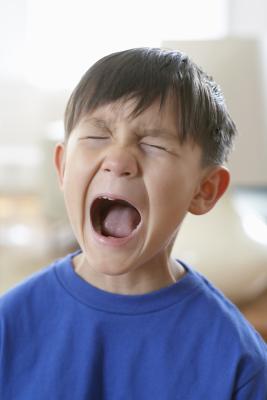When your child yells, “I hate you,” at the top of her lungs and then slams the door to her room in your face, it may take all your strength to hold yourself back and not react. But, managing your own anger in the heat of the moment will make everything easier in the long run. Your goal is to teach your child to gain control of her temper and stop the outbursts. If you engage in a yelling match, you’re only adding fuel to the fire.
Your Reaction
You are probably going to be angry when your child talks back to you, argues with you and generally acts defiantly. If you react with an outburst of your own, you teach your child that is the way to behave. But if you remain calm and collected, you model good behavior. When your child yells at you, take a deep breath and respond to him in a calm, but firm, way. Besides, you don’t want to give your child the satisfaction to see you lose control.
Mellow Kids
For a kid who rarely misbehaves or has tantrums, you have an easy job. In fact, 60 percent of kids have an easy and flexible temperament, and 25 percent of kids have a fearful and sensitive temperament. Only 15 percent of children are difficult and have frequent outbursts. When your easy-going child does break down, simply remind her that you do not allow yelling and name-calling. Wait a minute, and then ask your child what is upsetting her. Guide her back to acceptable behavior.
Difficult Kids
The 15 percent of kids who have frequent, angry outbursts are tougher to manage, but you can do it. Stop your child from yelling and/or throwing objects by putting him in time-out. When he calms down, ask him what has him so upset. Encourage him to voice his problems rather than resort to tantrum behavior. Listen to what your child tells you and commiserate a little by telling him that you understand why he is upset. After you demonstrate that you heard him, tell him that you do not allow that behavior. Make it clear, for example, that you don’t allow screaming, hitting, kicking, pushing, door-slamming, throwing or breaking things.
Redirect
Teach your child appropriate ways to deal with her anger. Maybe she can go outside and kick a ball around or ride her bike. Some children find it therapeutic to draw a picture of what is upsetting them. Maybe you can offer to do something with your child, like cook dinner together or work in the yard.
Avoiding Outbursts
During your child’s calm times, encourage him to voice his anger when he feels it coming on. He can tell you that he is mad, for example, because he wanted to play baseball with his friends but that you are forcing him to clean his room or do another chore. Praise your child for telling you instead of screaming at you, but remind him that he has chores to do. Also, make sure your child gets enough exercise because kids who have big tempers tend to need a lot of physical activity. It helps them burn off stress. If your child simply cannot control his anger at home, gets in outbursts with friends and at school, seek professional help from a trained counselor or psychologist.





